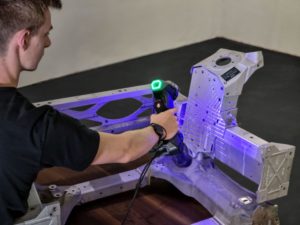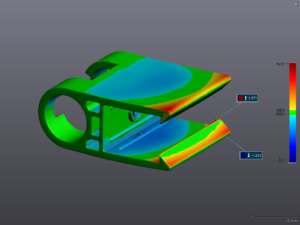Nowadays, for a wide variety of applications, prototyping, engineering and quality control can be strongly accelerated by using latest 3D scanning technology. With this in mind, AMSOL S.à r.l. specialised in 3D printing services, has recently invested in the acquisition a handheld certified 3D scanner. This innovative solution makes their customers benefit from new possibilities in additive manufacturing and overcome the constraints of traditional manufacturing. It allows sourcing 3D printed parts from single copies to serial production in high-performance materials from plastic to metal.
„Adding this certified 3D scanner to our machine line-up is essential to accelerate and optimise the current 3D design processes in different phases of our engineering workflow“, says Dean Kauffmann, CEO of AMSOL.
The integration of a 3D scanning system is also an opportunity to answer some upcoming challenges like quality assurance and the acceleration of 3D printing in emerging industries that are still in the early stage of new product development, such as in the space sector or in the area of e-mobility.
3D scanning is a type of digital modelling technology that creates accurate 3D models using lasers and a mathematical calculation called triangulation. The purpose of a 3D scanner is to create a 3D model with a volumetric accuracy between 0,020 mm and 0,060 mm per scanned meter. Upon completion, the 3D model consists of a point cloud with a mesh resolution up to 0,100 mm of geometric samples on the surface of the subject.
AMSOL is using the scanner internally for production and quality control, capturing the changes in the as-built measurement of parts after their manufacturing phase. The process of comparing 3D scan data against a CAD model is referred to as „3D deviation comparison“ and is an accurate technique to inspect a part in its overall shape and dimensions. It helps quickly identifying issues such as part dimension tolerances, warpage or overall scale issues, offering their customers ISO 17025 certified quality reports on 3D printed parts.
Besides internal use, AMSOL will provide their customers with 3D scanning services on reverse engineering of mechanical parts where a digital copy is lost or not available. It is also useful for engineers who often need to design parts around a given assembly. With a 3D scan of the given environment, CAD models can be easily incorporated, and assemblies can be verified before and during production. Thanks to the feature that the scanner is handheld, parts at any location can be digitalized or inspected.
3D scanning is part of innovative product development and production, involving a range of 3D printing technologies and auxiliary services like post-processing, 3D modelling and quality control of additive manufactured products.

